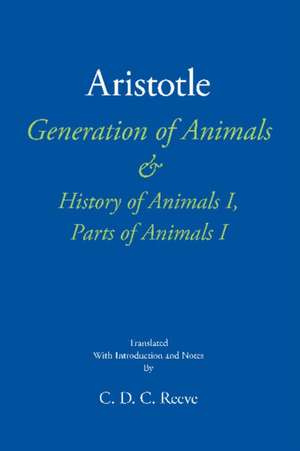Generation of Animals & History of Animals I, Parts of Animals I: New Hackett Aristotle
Autor Aristotle Traducere de C. D. C. Reeveen Limba Engleză Paperback – 4 dec 2019
Preț: 203.73 lei
Preț vechi: 233.79 lei
-13% Nou
Puncte Express: 306
Preț estimativ în valută:
38.100€ • 42.37$ • 32.78£
38.100€ • 42.37$ • 32.78£
Carte disponibilă
Livrare economică 31 martie-14 aprilie
Livrare express 15-21 martie pentru 68.34 lei
Preluare comenzi: 021 569.72.76
Specificații
ISBN-13: 9781624668272
ISBN-10: 1624668275
Pagini: 488
Dimensiuni: 230 x 153 x 23 mm
Greutate: 0.64 kg
Editura: Hackett Publishing Company, In
Colecția Hackett Publishing Company, Inc.
Seria New Hackett Aristotle
ISBN-10: 1624668275
Pagini: 488
Dimensiuni: 230 x 153 x 23 mm
Greutate: 0.64 kg
Editura: Hackett Publishing Company, In
Colecția Hackett Publishing Company, Inc.
Seria New Hackett Aristotle
Recenzii
"C.D.C. Reeve's annotated translation of Aristotle's Generation of Animals provides novices and experts alike a much-needed modern and readable, yet accurate and technically rigorous, entry to this difficult text. By printing it together with translations of the methodologically prior works, History of Animals I and Parts of Animals I , readers now have access to what are arguably Aristotle's philosophically richest biological texts.The Introduction helpfully situates the project of Aristotle's biology into its metaphysical and (natural) scientific context, but it also does much more. It offers a panoramic, illuminating, and characteristically provocative interpretative picture of Aristotle's philosophical endeavors as a wholeone that demands to be assessed in its entirety, and that is supported by a wealth of references to, and quotations from, mostly Aristotle himself. The book provides an invaluable resource for anyone trying to understand Aristotle's fascination with living nature" Mariska Leunissen, The University of North Carolina, Chapel Hill


